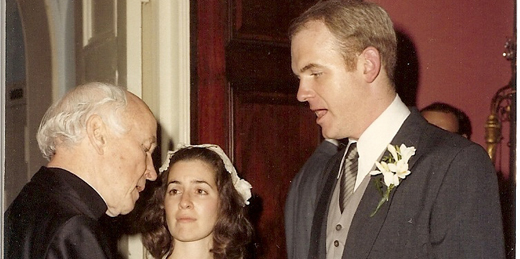Milestone Note: Happy Anniversary XXVII
Friday, October 3rd, 2008Here we are with the priest who married us, Monsignor Wilders of St Thomas More. I don’t think that I’ve ever noticed that look in Kathleen’s eyes before; I am one lucky guy. I still have the cravat, although I’ve never worn it again. Gee I am tall, am’t I.
We celebrated, this year, at La Grenouille. Two years ago, we celebrated our twenty-fifth anniversary at a bistro in the neighborhood, with twelve friends. Tonight was somewhat cheaper, but then there were only two of us. We were treated extremely well, and the evening was both magnificent and great fun: fancy but not formal, a mode that I wish more of my countrymen knew about. The waiters were only too happy to bring us extra baguette rolls so that we could sop up the sauce of the lobster ravioli that arrived, unordered, between the first course and the second. (I took away the receipt but not the bill, so I can’t tell if I was charged for the ravioli. I don’t think that I was.) Kathleen’s mother would have been horrified by the sopping up, but she would have had an absolute stroke when a woman at the next table asked to see the ring on Kathleen’s right hand — and Kathleen took it off to show it to her.
While I can remember: An excellent Gigondas to start with and a very nice Bordeaux after, a Haut something. For starters, I had the sweetbreads special. Because it tasted better with every bite, I wished that I could just have some more. Kathleen had a risotto, but I was too besotted with the sweetbreads to ask her how it was, and, anyway, she wouldn’t have told me, because she was already eavesdropping on the ladies at the next table (one of whom would ask to see the ring). For dinner, Kathleen had Dover sole. She would have had it anyway, but her father had asked her, on the phone that afternoon, to have it “for him.” I had the pheasant special.
Pheasant special: doesn’t that sound pretentious! Something under glass! In the event, the plate held three medallions of pheasant — I’d say it was thigh, but I’m not an experienced consumer of game — wrapped in thin sheaves of cabbage and topped with a sauce that made a little bit of foie gras go a very long way. Not a bone in sight. I didn’t have to ask for a baguette to sop of the sauce this time, because there were two quennelle-shaped blimps of puréed potato to do the job.
We were asked at the start, as one always in the best temples, if we wanted a dessert soufflé. Kathleen remembered that we wouldn’t. We would have so much wine left over after the main course that we’d need a good plate of cheese to finish us off. And indeed we did. The cheeses were wonderful, but they didn’t come with labels, so I can’t tell you exactly what they were; suffice it to say that the plate offered a high-end spread of the same range that you’ll get chez moi: from chèvre to brie via bleu. The star of the plate, however, was a honeycomb. Just one each.  Neither one of us had ever eaten a honeycomb.
In the course of the evening, I spoke a bit of French and talked a bit of French politics. It ought not to have been remarkable, but in any case it did not make me any enemies. Walking down 52st Street toward Madison afterward, our arms around each other, I asked Kathleen (who had so très très bien dîné that she couldn’t wait to get into a taxi), “Which do you think they liked better, my accent aigu or my accent grave?” “Your accent both!” she burst out (pronouncing the “th” as we do).
I’m a good enough cook to know that the meal was fantastic, but not good enough to tell you how and why. Which is how I like it. As I always say, my idea of “roughing it” is staying at home. But my idea of having a good time at a restaurant seems to be something that the good people at La Grenouille knew all about without my having had to ask.





